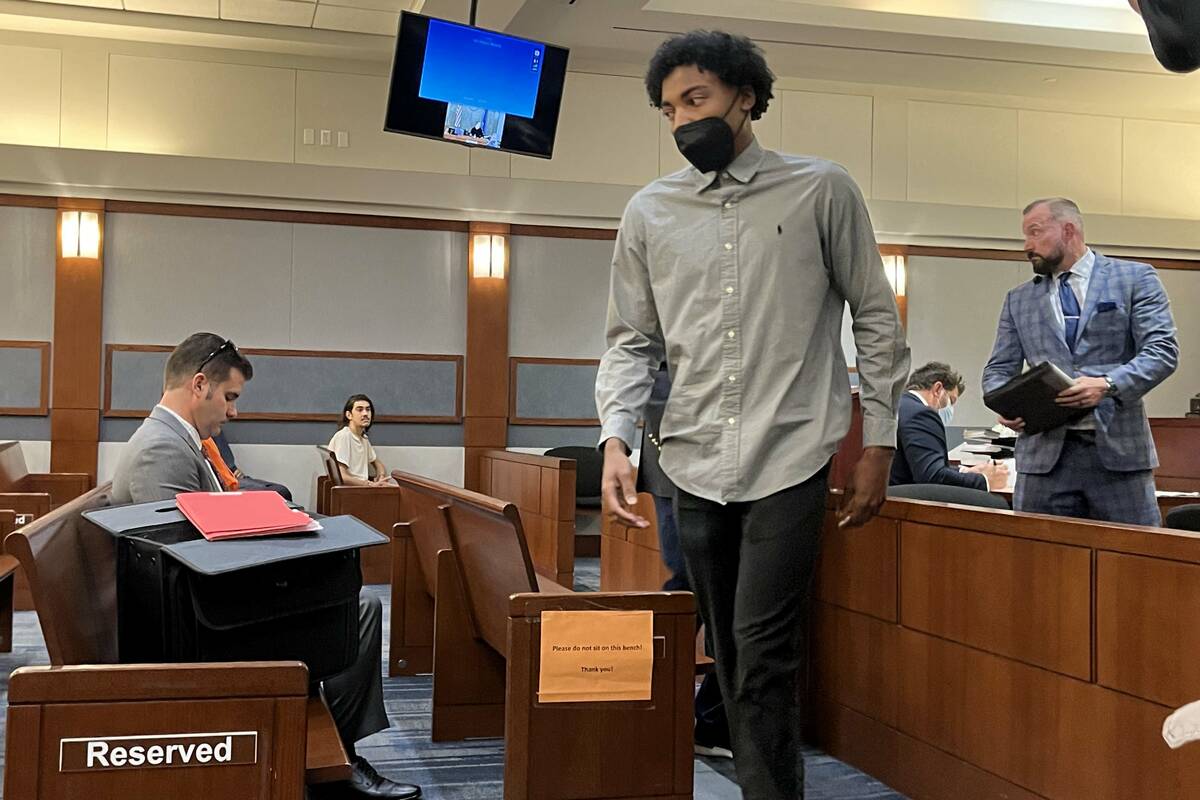Nevada Supreme Court declines to dismiss Zaon Collins’ DUI charge
The Nevada Supreme Court has denied a petition to dismiss a DUI charge against former UNLV basketball recruit Zaon Collins, who is accused of causing a deadly crash nearly two years ago.
A two-page order filed on Monday indicates that the justices do not believe that the Supreme Court’s “discretionary extraordinary intervention is warranted” in the case. The order was signed by Justices James Hardesty, Lidia Stiglich and Douglas Herndon.
“They decided not to rule on the merits of the petition,” Chief Deputy District Attorney Eric Bauman said Wednesday.
Collins’ defense attorneys, David Chesnoff and Richard Schonfeld, filed the petition in January, arguing that the DUI charge is based on unconstitutional state laws regarding driving while under the influence of marijuana.
The justices wrote in Monday’s order that Collins “has a plain, speedy and adequate remedy in the ordinary court of the law.” The justices seemed to agree with prosecutors’ arguments from prior filings that Collins should appeal a future finding of probable cause or possible conviction.
The Clark County district attorney’s office is continuing to pursue DUI and reckless driving charges against Collins after a grand jury refused to return an indictment on the DUI charge in March 2021.
A preliminary hearing in the case, when a judge would determine if there is probable cause for Collins to face the charges, was delayed while attorneys waited for the Supreme Court’s decision.
Bauman said Wednesday that prosecutors are prepared to go forward with both charges at a preliminary hearing.
Collins’ defense attorneys did not immediately reply to a request for comment.
A petition from Collins’ defense asking the Supreme Court to reconsider its order was rejected on Wednesday because it was “filed incorrectly,” according to court documents. Defense attorneys have until Nov. 28 to refile the petition for reconsideration.
Attorneys previously asked for a lower court to dismiss the DUI case against Collins, but Justice of the Peace Suzan Baucum denied the defense motion in July 2021. District Judge Susan Johnson filed court papers in January refusing to reverse Baucum’s decision.
Chesnoff and Schonfeld have argued that Collins was not impaired by marijuana at the time of the Dec. 30, 2020, crash, which left 52-year-old Eric Echevarria dead. Collins, 19 at the time, was driving his 2016 Dodge Challenger at nearly 90 mph in a 35 mph zone when he crashed into a 2016 Hyundai Accent driven by Echevarria, police have said.
Police have said Collins had 3 nanograms of THC per milliliter of blood in his system. Defense attorneys have argued that the level of THC was so low that Collins could have consumed the marijuana days before the crash. The legal limit for drivers in Nevada at the time of the crash was 2 nanograms per milliliter.
Chesnoff and Schonfeld have argued that a new state law, enacted in July 2021, should apply to Collins’ case because the case is still being litigated. That statute removed a prohibition on specific amounts of marijuana in a driver’s blood for misdemeanor cases but maintained the limit in felony DUI cases.
The limit of 2 nanograms per milliliter was set in 1999 based on the minimum level of THC that technology at the time could test for. Previous court filings from Collins’ lawyers have argued that the limit is arbitrary, with “no rational basis” to show whether a person was impaired.
Collins is set to appear in Las Vegas Justice Court on Dec. 15.
Contact Katelyn Newberg at knewberg@reviewjournal.com or 702-383-0240. Follow @k_newberg on Twitter.























